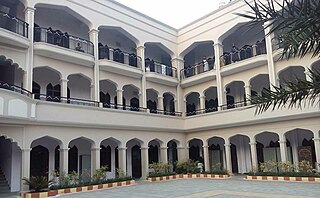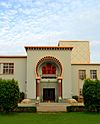Manazir Ahsan Gilani was an Indian Sunni Islamic scholar and former Dean of the Faculty of Theology at Osmania University. Some of his notable works include Tadwin-e-Hadith, Muqaddama Tadwin-e-Fiqh, Sawanih-e-Abu Dharr Ghifari, and Sawanih-e-Qasmi. Muhammad Hamidullah, a historian and hadith researcher, was among his students.

Muḥammad Manz̤oor Nomānī was an Indian Islamic scholar. Prominent among his written works are Maariful Hadith, Islam Kya Hai?, and Khomeini and the Iranian Revolution.

Anwar Shah Kashmiri was an Islamic scholar and poet from Kashmir in the early twentieth century, best known for his expertise in the study of hadith, a strong memory, and a unique approach to interpreting traditions, as well as the fourth principal of Darul Uloom Deoband. With an ancestral heritage of religious scholarship rooted in Baghdad, he acquired training in Islamic sciences at Darul Uloom Deoband under the mentorship of Mahmud Hasan Deobandi, alongside enjoying a spiritual journey with Rashid Ahmad Gangohi. Initiating his vocation as the first principal of Madrasa Aminia, he embarked on a hajj in 1906 with a sojourn in Medina, dedicated to exploring the depths of hadith literature. Subsequently, he joined Darul Uloom Deoband, serving as the post of Sheikh al-Hadith for nearly thirteen years before choosing Jamia Islamia Talimuddin as his final destination for his academic voyage. Although he displayed limited inclination toward the written word, a handful of treatises flowed from his pen. Yet, the bulk of his literary legacy has been preserved through the efforts of his students, who transcribed his classroom lectures, discourses, and sermons. While the crux of his scholarly work centered on championing the Hanafi school and establishing its supremacy, he also garnered recognition for his comparatively liberal approach to various religious matters. His publications found their place under the patronage of Majlis-i Ilmi, a scholarly institution established in Delhi in 1929. His scholarly credentials received official endorsement with the publication of Fayd al-Bari, a four-volume Arabic commentary on Sahih al-Bukhari, curated by Badr-e-Alam Mirati and published in Cairo, with the financial support of Jamiatul Ulama Transvaal.

Mazahir Uloom is an Islamic seminary located in Saharanpur, Uttar Pradesh. Started in November 1866 by Sa'ādat Ali Faqīh, and developed further by Mazhar Nanautawi and Ahmad Ali Saharanpuri; it is regarded as the second most influential and major Deobandi seminary in India. The earliest graduates of the seminary include famous Hadīth scholar Khalil Ahmad Saharanpuri. In 1983, the seminary split into two with the establishment of Mazahir Uloom Jadeed as a new independent seminary. Since then the seminary has been named as Mazahir Uloom Waqf Qadeem.

Madrassa Shahi is an Islamic seminary in Moradabad, Uttar Pradesh. It was established in 1879 by the poor Muslims of Moradabad under the supervision of Islamic scholar, Muhammad Qasim Nanautawi, who also established the Darul Uloom Deoband. This started as Madrasatul Ghuraba, but gained recognition as Madrasa Shahi. Its first principal was Ahmad Hasan Amrohi.
Muhammad Sufyan Qasmi Siddiqi is an Indian Sunni Muslim scholar and current rector of Darul Uloom Waqf, Deoband.
Saeed Ahmad Akbarabadi was an Indian Islamic scholar and an Urdu-language author who co-founded the Nadwatul Musannifeen. He served as the dean of the Faculty of Theology in Aligarh Muslim University.
Muhammad Taqi Amīni was an Indian Sunni Islamic scholar, jurist, Urdu author and the dean of Theology faculty of Aligarh Muslim University. He is known for his works on Islamic jurisprudence, and his book Fiqh Islami ka Tareekhi Pas-e-Manzar is a required reading for master's degree in Islamic studies at the Islamic University of Science & Technology.
Zayn al-Abidin Sajjad Meerthi (1910–1991) was an Indian Sunni Muslim scholar and historian and head of the Islamic studies department of Jamia Millia Islamia. His book Tarikh-e-Millat is required reading in the syllabus of Darul Uloom Deoband and in madrasas affiliated with it.
Saeed Ahmad Palanpuri, was an Indian Sunni Muslim scholar and author who served as Shaykh al-Hadith and Principal of Darul Uloom Deoband. A number of his books are required readings in Darul Uloom Deoband.
Aziz-ul-Rahman Usmani was an Indian Sunni Muslim scholar who served as first Grand Mufti of Darul Uloom Deoband. He is best known for his Fatawa Darul Uloom Deoband. His brother was Shabbir Ahmad Usmani.

Mamluk Ali Nanautawi was an Indian Sunni Muslim scholar who served as the Head Teacher of Arabic language at the Zakir Husain Delhi College. His notable students include Muhammad Qasim Nanautawi, Rashid Ahmad Gangohi and Muhammad Yaqub Nanautawi.
Atīqur Rahmān Usmānī was an Indian Muslim scholar and an activist of Indian independence movement who co-founded Nadwatul Musannifeen and the All India Muslim Majlis-e-Mushawarat.

This bibliography of Darul Uloom Deoband is a selected list of generally available scholarly resources related to Darul Uloom Deoband, a leading Islamic seminary and Muslim theological centre in India at which the Deobandi movement began, founded in 1866. It is one of the most influential reform movements in modern Islam. It created a largest network of satellite madrasas all over the world especially India, Bangladesh, Pakistan, Afghanistan neighboring countries in Asia and beyond, and as far afield as the Caribbean, South Africa, United Kingdom and the United States. Islamic Revival in British India by Barbara D. Metcalf was the first major monograph specifically devoted to the institutional and intellectual history of Deoband. Syed Mehboob Rizwi wrote History of Darul Uloom Deoband in 1977 in 2 volumes. This list will include Books and theses written on Darul Uloom Deoband and articles published about Deoband in various journals, newspapers, encyclopedias, seminars, websites etc. in APA style. Only bibliography related to Darul Uloom Deoband will be included here, for Deobandi movement, see Bibliography of Deobandi Movement.

Maarif al-Sunan sharh Sunan al-Tirmidhi is a six-volume Arabic commentary on Sahih al-Tirmidhi. It was authored by Yusuf Banuri, who compiled the work based on the teachings and lectures of Anwar Shah Kashmiri. Published in 1968, the commentary aimed to address the errors found in another commentary called Al-Arf al-Shadhi sharh Sunan al-Tirmidhi, which was also based on the teachings of Anwar Shah Kashmiri.

Anwar al-Bari sharh Sahih al-Bukhari is a 19-volume Urdu commentary on Sahih al-Bukhari. It was compiled by Ahmad Rida Bijnori, drawing from the teachings of Anwar Shah Kashmiri. This commentary features the original Arabic text of Sahih al-Bukhari alongside a literal Urdu translation, enhancing its accessibility to a wider audience. It provides biographical information about hadith scholars and narrators in the transmission chains, as well as delves into various facets of Islamic jurisprudence and theology. The work extensively defends the validity of the Hanafi school of jurisprudence. The compiler, however, only completed the commentary up to the end of the Book of Prayer, accompanied by a discussion on the final chapter concerning Imaan (faith) and Tawhid (monotheism).

Al-Arf al-Shadhi sharh Sunan al-Tirmidhi is a multi-volume Arabic commentary on Sahih al-Tirmidhi attributed to Muhammad Chiragh Punjabi, was crafted by synthesizing the annotations and teachings of Anwar Shah Kashmiri during his teaching career. Its initial publication dates back to 1919. Notably aligned with the Hanafi school of thought, the purpose of Kashmiri, as reflected in this work, extended beyond the clarification of ideas and grammatical intricacies; it predominantly aimed at establishing Abu Hanifa's elevated stature in the realm of jurisprudence. In 1968, Yusuf Banuri introduced Maarif al-Sunan sharh Sunan al-Tirmidhi across six volumes to address any identified discrepancies within Al-Arf al-Shadhi.
Ishtiaque Ahmad Qasmi is an Indian Islamic scholar, mufti, and writer. He has been serving as a teacher at Darul Uloom Deoband since 2008.
Muhammad Ibrahim Balyawi (1887–1976), also spelt as Muhammad Ibrahim Balliavi, was an Indian Sunni Muslim scholar who served as the 6th Principal of Darul Uloom Deoband. He spent almost 50 years instructing Hadith, Mantiq, Islamic philosophy, and other subjects at Darul Uloom Deoband.









